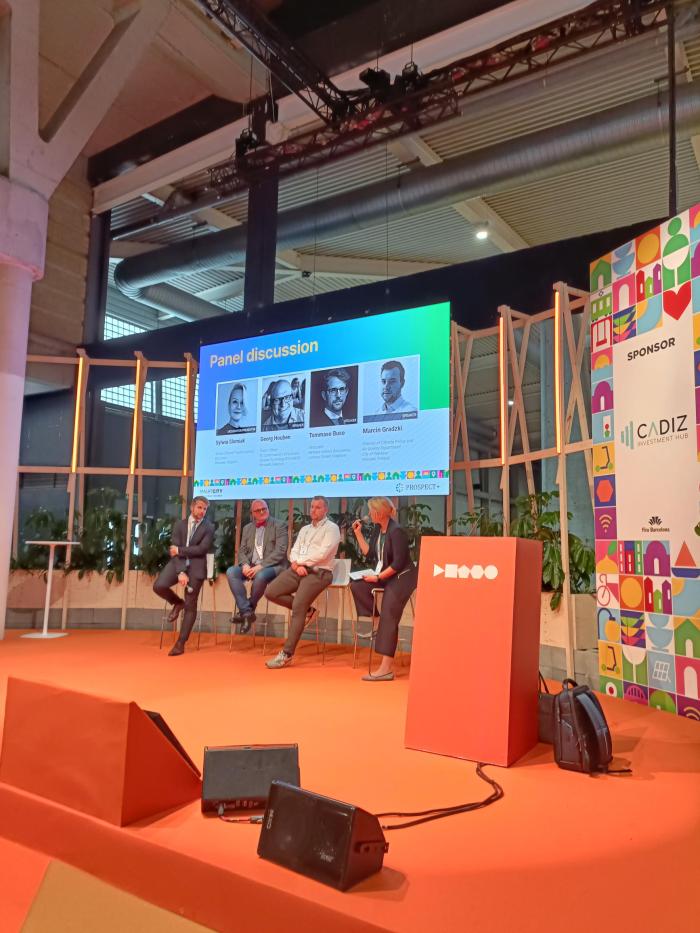
At the Smart City Expo World Congress 2024, the Agora Session on "Innovative Financing Options and Private Capital for Energy Transition in Cities" explored the evolving landscape of urban sustainability funding as traditional subsidies phase out. The session, which engaged an audience of 60 participants, focused on how cities can secure the financing needed to drive their energy transition goals, highlighting innovative solutions and the collaborative role of both the public and private sectors.
A Positive Shift Towards Innovative Financing
As cities face the end of traditional subsidy models, they increasingly turn to alternative financing options such as citizen finance, energy performance contracts (EPCs), green bonds, and soft loans. The session emphasised that cities don’t need to reinvent the wheel but instead can embrace various existing financing tools to better equip them to achieve their energy transition targets. Public authorities are encouraged to adapt their strategies and explore these innovative options with the right support in place.
Overcoming Challenges Together
Many cities are eager to try new financing mechanisms but often face challenges, such as a lack of expertise, insufficient staffing, and concerns about transparency when working with the private sector. Regulatory hurdles and an underdeveloped market for some of these instruments also exist. The session underscored that these challenges can be overcome with greater capacity-building and strategic support, helping cities move beyond traditional funding sources and access new opportunities for sustainable urban projects.
Building Synergy Through EU Initiatives
Georg Houben from the European Commission’s Directorate General for Energy highlighted the exciting potential for EU initiatives to build bridges and integrate financing options more effectively. He pointed out that while numerous funding opportunities are available, a more coordinated approach could provide cities with a clearer path forward. Initiatives such as Net Zero Cities (NZC), the Smart Cities Mission (SCM), and the Covenant of Mayors (CoM) can play a crucial role in helping cities navigate these funding challenges by offering more unified and coherent solutions. Houben also noted the growing need for tailored support for small and medium-sized cities, which often face challenges different from those of larger urban areas.
Practical Solutions and Collaborative Support
The session provided actionable insights and strategies for cities looking to secure financing. Marcin Gradzki from the City of Warsaw discussed how cities can align their long-term portfolios with the right funding sources, especially in light of the tight deadlines of the Recovery Fund (which requires projects to be completed by 2026). Tommaso Buso from Bankers without Boundaries explained how cities can access further support once they achieve a Climate City Contract (CCC) label, opening the door to private investment opportunities, including off-balance sheet operations when debt ceilings are a concern.
Support and Capacity Building
The importance of local language support was highlighted by Sylwia Slomiak from Eurocities, who suggested that guiding in multiple languages could significantly improve access to financing for cities across Europe. Georg Houben also encouraged cities to join the Covenant of Mayors, a network of over 11,000 cities across Europe, which offers a unified, integrated approach to accessing EU funding and fostering collaboration across cities of all sizes.
Conclusion
As European cities look to accelerate their energy transitions, the session highlighted the critical role of innovative financing models in ensuring the success of sustainability projects. While challenges remain, cities are increasingly equipped with new tools, frameworks, and EU-supported initiatives to secure private investment, overcome regulatory barriers, and build internal capacity. With public-private partnerships, strategic planning, and a coordinated approach to EU support, cities can unlock new funding avenues and ensure that their sustainability projects are both financially viable and impactful.
This session was part of the PROSPECT+ Policy Dialogue, an ongoing effort to address the financing needs at the local level and provide practical solutions for cities to overcome their energy transition challenges. The session's focus on building bridges between initiatives and fostering collaborative efforts set a positive tone for the future of sustainable urban development across Europe.
